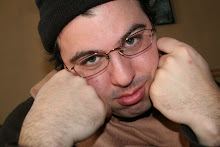The Texas Chainsaw Massacre employs deranged cannibals to
probe the threat of economic collapse; Dawn of the Dead utilizes zombies to
exploit conspicuous consumption; John Carpenter's The Thing depicts
shape-shifting aliens as a metaphor for AIDS; and all three of them continue to
scare the shit out of audiences years after their initial release. That's the
true test of any great horror pic, its ability to invoke fear or get under the
skin of viewers while engaging them in a cathartic experience. Robert Eggers's
The Witch doesn't speak to the dark issues concerning human kind with the same intensity
as its vintage brethren, but it succeeds wholeheartedly in providing viewers
with the heebie-jeebies. Okay, so the film poses a few questions about
spirituality and gender roles, but let's be honest, this is a bid by New
Hampshire-born Eggers to introduce horror fans to the regional tales of
witchcraft that haunted him as a kid.
1630, New England. A religious zealot (Ralph Ineson) and
his family are banished from their colonial plantation and forced to make camp
on the edge of a foreboding forest. It isn't long before their crops die off,
their livestock begin to articulate words and their children start to vanish
into the night. Paranoia runs rampant among the family who accuse one another
of consorting with the devil.
I attended church regularly as a kid. I remember being
freaked out by the more fanatical devotees, the dudes that would convulse in
their pew while extending their palms toward the ceiling and shouting
"amen" to the rafters. Were they better Christians than me? Did God somehow
notice them more than me? Was it simply a cry for attention?
William (Ineson) conforms to a theology too rigid for
even his fellow Puritans. He becomes convinced that living in peril is part of
the lord's design to prepare him for salvation. His baritone voice is one you
get lost in as it wraps around you. It booms from the theater speakers with a
chilling authority. It's ironic then that his character surrenders all sense of
power before the lord as his family is torn apart before him. The worse things
get, the more William believes it is God's plan.
Cinematographer Jarin Blaschke and production designer
Craig Lathrop deliver sumptuous imagery more realistic than anything offered
via the found footage genre. The shadowy farmhouse, its bleak browns the color
of the land that surrounds it, and monochromatic fields provide the movie a
ghastly quality. They're aided by an unnerving script that elicits panic and
dread at every turn. The old English dialogue (taken from 16th century
journals) only adds to the chilling realism of the picture.
Anya Taylor-Joy in the role of William's daughter
Thomasin delivers a performance that resonates with complicated anxiety and
vulnerability. Harvey Scrimshaw plays her younger brother Caleb. Their sibling
rivalry is transcendent. It smacks of the Crucible. All kids pick on one
another, but the repercussions of their antagonism is harrowing. Caleb becomes
aware that his sister is maturing into a woman. The pain of misunderstanding
that runs across his brow the first time he catches a glimpse of her cleavage
is not limited to 17th-century protestant children, but rather is perpetual.
Eggers
exhibits a great deal of courage in his approach to the material. The horror
creeps up slowly yet early. The witch is not a shadowy figure appearing at the
periphery of the family's world, but rather a grotesque crone who uses
cauldrons and the blood of babies to concoct evil spells. The fact that she
could appear while sunlight fights to dance between the trees or against a
backdrop of night results in an experience that bristles with menace. Babies
are slaughtered, goats speak to people, the witch appears in the form of a
fluffy bunny, yet the mood remains so brittle it could snap.
This is not only the best horror film of this young year,
it is a movie that will surely appear on many critics' top ten lists come
December. It is a truly creepy exercise and one that demonstrates great promise
for all those involved.




Great review! I felt that THE WITCH was fantastic. It's a tale that speaks to the paranoia and fear of God as much as that of the devil. The sins committed by the family are so tame in today's comparison; lying to your spouse, having a dirty thought, disobeying your parents. The Puritans were so strict on themselves that it seemed to make religion a burden more than a helpful blessing. Black Phillip (the devil?), the rabbit (the familiar?), and the witch (sin?) all helped bring this film to a slow simmer of paranoia and horror.
ReplyDeleteIts arthouse sensibility, strong direction, bleak cinematography, beautiful art direction, and spot-on performances brought this horror film to a higher level. And Eggers had to deal with animals and children on his first feature excursion. A brave man, indeed.
This comment has been removed by the author.
ReplyDelete